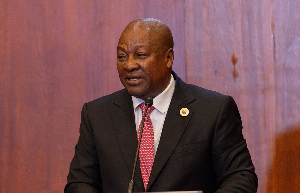Business News of Tuesday, 29 January 2019
Source: ABSA Group
Absa Group Chief Executive, Maria Ramos to retire at end of February 2019
Absa’s Group Chief Executive Officer, Maria Ramos will retire at the end of February 2019. Maria has chosen to retire in February when she turns 60 and will become eligible to do so.
Maria has been Group Chief Executive since 2009. She has led the Group through significant milestones including: acquiring Barclays’s Africa subsidiary banks; the sell-down and the start of separation from Barclays, establishing a new strategy as a standalone financial institution as well as brand refresh in South Africa.
The Board has appointed Mr. René van Wyk as the Interim Chief Executive with effect from 1 March 2019.
René has been a non-executive director on the Boards since February 2017. He was previously the Registrar of Banks within the South African Reserve Bank and retired from that position in May 2016. René had 19 years of experience with Nedbank, including as Executive Director of Risk for the then listed Nedcor Investment Bank. He was also Chief Executive Officer of Imperial Bank.
René will remain on the Boards and will be classified as an executive director with effect from 1 February 2019.
Absa will announce a permanent appointment to the position of Group Chief Executive in due course, following the finalization of the ongoing process of appointing a new CEO, and the requisite regulatory approvals.
“On behalf of the Boards, I wish to thank Maria for a decade of dedicated service to our Group and wish her all the best in her future endeavours. Absa is a different business to the one Maria joined in 2009. Instead of a South African bank it is now a pan-African financial services provider with a footprint in ten countries across Africa. She will leave the Group with our major priorities on track including the separation from Barclays and the implementation of our corporate strategy”, said Absa Group chairman, Wendy Lucas-Bull.
“It had never been my intention to stay this long, as I have always believed that a CEO’s tenure should allow for a regular refresh. My earlier intentions to step down were curtailed by Barclays PLC’s 2016 decision to sell down their controlling stake, a unique set of circumstances that required continuity. So with my coming 60th birthday I have made the decision to leave the position open for a new Chief Executive to lead the Group on the next leg of its exciting journey”, said Ms Ramos.
“I would like to thank members of the Board and Exco, past and present, for all the support they have provided over the years. I am also grateful for the opportunity to lead an organization with committed colleagues,” she said.
Profile of Maria
Maria has led the Group through a number of significant milestones since 2009. She joined Absa in the midst of the financial crisis and steered the Group through that. Under her leadership, Absa acquired Barclays’ eight African subsidiaries for R18.3bn in 2013, the largest African acquisition ever by a South African bank. This transformed our business mix, as rest of Africa generated 20% of Group first-half earnings. In the last 10 years, the Group has transformed to a pan-African financial services provider.
Maria also appropriately led the organization through a period of challenges including the financial market disruption in South Africa in December 2015, and issues related to the Public Protector Report.
She also led our separation negotiations with Barclays, which resulted in a R12.6bn up front contribution plus R2bn earmarked for BEE. PLC’s sell-down involved two book builds with the second one worth R38bn, a record for South Africa. Maria oversaw the initial stages of separation, refreshing Absa’s brand and achieving regulatory deconsolidation.
She also drove our new growth strategy as an independent financial institution. Over the last decade, Absa grew its dividends per share 82% to last June, and paid a R6bn special dividend in 2013. Absa Group’s balance sheet has also been strengthened, with its tier 1 ratio improving to 12.8% on a Basel III basis from 11.6%.
Entertainment











